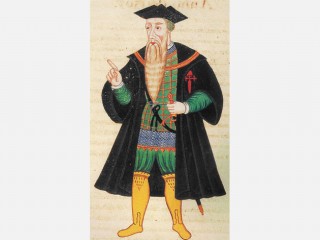
Afonso De Albuquerque biography
Date of birth : -
Date of death : -
Birthplace : Alhandra, Portugal
Nationality : Portuguese
Category : Historian personalities
Last modified : 2010-11-09
Credited as : Governor of India, nobleman,
The Portuguese nobleman Afonso de Albuquerque (ca. 1460-1515) is best known as governor of India. He is also considered to be the founder of the Portuguese imperial system.
Afonso de Albuquerque was born to a family of minor Portuguese nobility. He fought in Portugal's wars in Spain and Africa. He was sent on a voyage to India in 1503-1504 and went to the East again in 1506 with Tristao da Cunha. In 1507 they captured the island of Socotra in the Arabian Sea, from where Tristao da Cunha sailed for India and Albuquerque for Hormuz. Albuquerque took Hormuz, the principal spice-distributing center for the Persian Gulf, and proceeded to India. He reached Cannanore in December 1508 and revealed his secret instructions to supersede Viceroy Francisco de Almeida, with the title of governor. Almeida, refusing to give up command, imprisoned him until a powerful Portuguese fleet under Fernando Coutinho arrived in October 1509 with a confirmation of Albuquerque's appointment. He then assumed power.
Albuquerque was the major figure in the establishment of the Portuguese sea empire in the East. In 1510 he captured Goa, which he fortified and made the chief trading post and permanent naval base in India. To give it a stable character, he offered lands and subsidies to Portuguese men who would marry native women. In 1511 Albuquerque captured Malacca; from this base he could control the trade from the East Indies and the coast of China. During his governorship Portuguese vessels touched on the coast of China and sailed to some of the islands of the East Indies, gaining naval ascendancy in the Far East.
In Goa again in 1512, Albuquerque strengthened Portuguese administration there and in other coastal cities and prepared a fleet for a campaign along the coasts of Persia and Arabia. His unsuccessful attack on Aden in 1513 failed to close the Red Sea to Moslem shipping. On his return to India, he secured from the King of Cambay the right to construct a fortress in Diu. His success brought friendly overtures from the Shah of Persia, the Samorin of Calicut, and the kings of Siam and Malacca, as well as several other rulers.
Portugal now controlled the principal strategic points from the east coast of Africa to Malacca, with the exception of the Red Sea. A system of licenses (called cartazas) required all ships to prove that they had paid customs duties at Malacca, Goa, or Hormuz. An unlicensed ship, particularly if it belonged to Moslems, was subjected to seizure and sinking. Albuquerque's policies thus had made the Portuguese the predominant, although not the only, commercial force in the East until the 17th century.
In 1515 Albuquerque was superseded by enemies he had previously sent back to Portugal as prisoners. He voiced his bitterness: "I am in ill favor with the king for love of men, and with men for love of the king." He died at sea on Dec. 16, 1515.
The best source for material on Albuquerque is by his son, Afonso de Albuquerque, The Commentaries of the Great Afonso Dalboquerque (1774; trans. with an introduction by W. de Gray Birch, 4 vols., 1875-1884). Edgar Prestage, Afonso de Albuquerque, Governor of India (1929), is a brief account. Elaine Sanceau, Indies Adventure: The Amazing Career of Afonso de Albuquerque (1936), is a pro-Portuguese treatment that makes extensive use of the sources. Richard Stephen Whiteway, The Rise of Portuguese Power in India, 1497-1550 (1899; 2d ed. 1967), and Charles R. Boxer's scholarly The Portuguese Seaborne Empire, 1415-1825 (1969) are excellent background works that rely on the writings of 16th century Portuguese historians for source material. See also K. G. Jayne, Vasco da Gama and His Successors (1910).
















